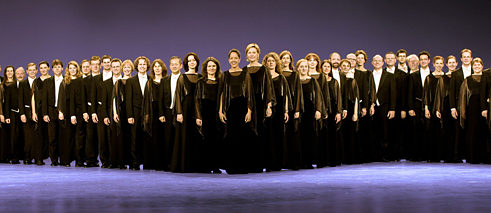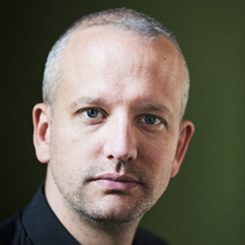German Season | Interview
Nicolas Fink | The Universal Language of Music

© Matthias Heyde
Bernese conductor Nicolas Fink has been permanent assistant conductor at the Berlin Radio Choir since 2010
Was this your first time in Indonesia?Yes, it was even the first time I travelled to Southeast Asia!
What were your expectations? How did you imagine Indonesia to be like?
I only knew little about Indonesia and read more about the history of the country in a travel guide. I quickly realized how culturally diverse this country is. That definitely made me curious!
What did you think about the choirs in Indonesia?
Before I came I already watched some videos of Indonesian choirs on YouTube and was amazed by their high quality. But only when I was there, I became fully aware of how dedicated and capable Indonesian people are when it comes to singing.
Did you have the impression that singing in Indonesia plays a different role than in Europe?
I think people in Indonesia are more willing to invest a lot of time in choral singing. To rehearse more than once a week doesn’t seem to be an obstacle here. I also noticed that community plays a huge part, perhaps especially when it comes to high quality aspirations. In Europe, I often see a tendency towards project choirs that come together for a limited time because the singers are fond of the level or the repertoire. The community is not really the main focus – which is a great pity because a choir can only develop its own tonal identity when there is a personal relationship between its members. This is also the case with professional choirs.
How did you perceive the three different cities you visited?
Jakarta is huge, chaotic and wonderful, unless you are in a hurry but are stuck in traffic. Medan left a lasting culinary impression – I am looking forward to having my next durian! Bandung was the greenest city of them and thus the prettiest.
How did you choose the repertoire?
Naturally, there is a focus on the German repertoire, and Brahms is the most obvious choice. But with Schönberg, we wanted to introduce something that is perhaps lesser known in Southeast Asia. The quality of the choirs justifies this rather bold decision. Of course there will also be Indonesian pieces.
Were there any moments during your stay in Indonesia that deeply moved you in particular?
A lot of things in Indonesia work differently than in Europe, our cultures are very different. That’s why I was particularly moved when I realized how much we actually have in common and how there was a deep understanding between us as soon as we started making music together. It makes me very hopeful to have experienced myself how the language of music is truly a universal one.
This interview was first published on the German Season/Nicolas Fink
